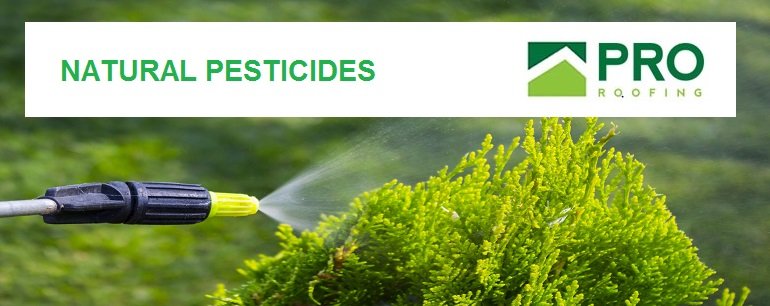Top 10 Eco Friendly Pest Control Methods
Natural Ways To Deal with Pests
Pest infestation is a major issue for homeowners. Pests have the ability to destroy your crops which will result to financial losses. Plus, pests such as rodents, roaches, and mosquitoes carry bacteria that can cause fatal health problems.
Proper pest management should ensure that your household and crops are healthy and safe. Unfortunately, most insecticides are not safe as they contain harmful chemicals. Edward Ellis, an environmentalist from Eco Pest Control recommended that enlisting to a pest control service should always be your last resort. You must first try to utilise effective housekeeping methods. Employ organic pest control techniques that are good for your wellbeing and the environment.
Environmental Impact of Pesticides
Historically, the most common way of getting rid of pests has been by the use of pesticides. Although they effectively kill targeted bugs, they have several harmful impacts and can harm untargeted animals, such as your household and your pets. Most pesticides take a long time to breakdown. They can stay in the ground and are referred to as residue chemicals. These chemical compounds will stay active and harmful for years to come. It contaminates the groundwater or extend to the adjacent property. When this occurs, the chemicals may make their way through the ecosystem and adversely affect many valuable animals. Fish and other animals can get ill or die. The contaminated ground is also toxic to humans for drinking.
Health Risks Associated with Pesticide Exposure
- Cancer
- Parkinson’s disease
- Alzheimer’s disease
- ADHD
- Genetic changes
- Birth defects
- Blood disorders
Advantages of Organic Pest Control
We have already looked at how organic pest control methods are safe for you and the environment. Here are additional benefits of using eco-friendly pest control:
- Better long-term results
- Does not harm your pets and useful animals
- Won’t harm landscaping
- Convenience
- No strong smell
Eco-Friendly Pest Control Options
There is a range of natural pest management approaches that are not widely publicised. They are a viable substitute for toxic pesticides and would have no harmful effects on humans or the environment. Here are the ten most common organic pest control options.
1. Cedar Oil
This is a natural substance made by cedar trees. Cedar oil is a non-toxic natural insect repellant which will repel mosquitos, termites, moths, cockroaches, fleas, and ants. It can also be used safely around your pets.
2. Instead of Baits Use Rodent Traps
Poison is brutal as it slowly and painfully kills rodents. It could also hurt your pet or another animal if it consumes a poisoned rodent. Neglected poison bait presents a risk if it is located by kids or pets. Therefore, it’s safe to avoid them.
3. Trap Insects Using Sticky Boards
Sticky boards are effective for catching bugs that crawl, such as mites, cockroaches, and spiders. Many sticky boards are lined with a sticky coating of glue and sometimes sprayed with scents intended to attract bugs. Sticky traps should be put on a vertical surface and replaced when dusty or full.
4. Freeze Your Woolens
You may have thought that adult moths eat your woolens, but it’s the moth larvae that actually do. A natural way of getting rid of moth larvae is by freezing them out. Simply place your clothes in a plastic shopping bag and place them in the freezer for two weeks.
5. Use Soapy Water to Eliminate Ants
Ants move by following a chemical trail. The chemical trail ‘shows’ ants what paths to take. Soap kills ants and a variety of other bugs, such as roaches. Spray ants explicitly with soapy water to choke them and use the soapy water to destroy their chemical tracks.
6. White Vinegar
Ants don’t like vinegar. Create a 50/50 solution of vinegar and water to fill a spray bottle. You should directly spray the ants with the solution to kill them and wash their tracks clean. The vinegar solution should be around windows, doors, and countertops to prevent ants from entering your home.
7. Neem Oil
This is a natural vegetable oil that is extracted from the seeds and fruits of the neem tree. Neem oil is a natural bug repellant used to deter pests such as moths, cockroaches, aphids, snails, and termites.
To prepare it, mix some soap with warm water, then gradually add the neem oil while intensely stirring. Then put the mixture in a spray bottle. When consumed by bugs, the oil disrupts their hormonal processes, making it much harder for them to grow and develop.
8. Beer to Fight Snails and Slugs
Snails and slugs can do a lot of harm to your garden. Use beer to control them. Snails and slugs are both drawn to beer. Pour beer into a little jar like a tuna can and put it on the surface in your backyard. As the snails and slugs climb into the container, they will drown.
9. Basil
Basil is not just a cooking hero that invigorates salads and foods but also a strong insect repellent that keeps mosquitoes and flies away. The plant produces a powerful scent, and so you don’t have to grind the leaves or undertake any preparations. Just plant in jars and leave behind doors and walls, and the bugs will stay away.
10. Diatomaceous earth
Diatomaceous earth is formed by crushing the remains of ancient diatomic fossils. This produces very thin, very sharp bits that cause significant breathing problems in small insects that breathe it or in mucosal tissues of slimy pests such as slugs and snails.
To summarize, pesticides are going to:
- Suck up your water supply
- Contaminate the food chain
- Harm untargeted, beneficial animals
Use organic pest control options to avoid the adverse effects of pesticides. Use the above eco-friendly pest control measures to eliminate pests without harming yourself, your family, pets, and the environment


